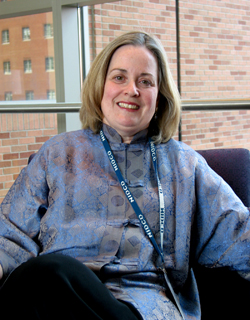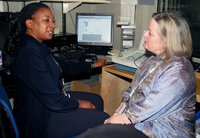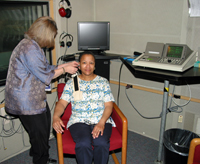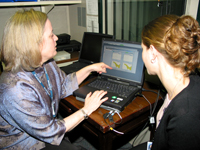 |
 |

|
|
Carmen C. Brewer, Ph.D., Audiologist, Chief, Audiology, Hearing Section, Neuro-Otology Branch, Division of Intramural Research, National Institute on Deafness and Other Communication Disorders (NIDCD), National Institutes of Health (NIH)
|
1. I chose this career because...
2. My typical workday involves...
3. What I like best/least about my work...
4. My career goals are...
5. When I'm not working, I like to...
|
|
1. I chose this career because...
|
Back to Top

|

|
|
Carmen Brewer reviews research involving tune deafness or dysmelodia with Howard University student Jennifer Jones.
|
I chose to become an audiologist because I was intrigued by the combination of science and working with people and helping them. As an undergraduate, I majored in speech pathology. During my junior year, I had the opportunity to take my first audiology course. That is when it all clicked. The professor was inspiring, enthusiastic, and dedicated to teaching. The field of audiology seemed so interesting, especially the diagnosis part. I liked the whole process of obtaining measures of various aspects of audition, deciding which test to conduct next, determining probable cause of the hearing loss and putting it all together to achieve a complete picture of a patient’s hearing status.
Parental Primers
Quite honestly, I was a lost soul during middle school and high school. My mother died when I was 10 years old and I was the oldest of 5 children. During my non-school hours, I helped run the household, and did my school homework. Occasionally, I escaped with friends to do the things that teenage girls did, which in my generation was listening to the Beatles!
My mother, who was born in 1920, earned a masters degree as a dietician. She served as a lieutenant in the Army in World War II. She later worked as a dietician in a veterans administration hospital where she met my father. After having children, she stayed home as a full-time mother. I was always proud of her education, especially in light of the time in which she grew-up. Very few women pursued higher educations at that time. Although she was an active influence for the first 10 years of my life, she continued to have an indirect influence on my life choices. I am sure that my decision to pursue a healthcare career was largely influenced by her career in the healthcare field, and by her desire to help others.
My father did not finish high school, but was an intelligent man who prided himself on his accomplishments. He encouraged his children to have that same pride and took great satisfaction in their accomplishments. His love of word games and the English language is being passed on through his children to his grandchildren.
College
After high school, I was sure that math was the subject for me and I entered college as a math major. By the end of my freshman year, I felt that math was not for me. It was too dry and too removed from people. I considered other options and came across speech pathology. In my 19-year-old way of thinking, it looked interesting and fun. I was determined to make a career choice that would bring be personal satisfaction rather than personal wealth!
My speech class was interesting and it eventually led to a course in audiology. The professor, was so inspiring and supportive. During my senior year, she assisted another student and myself in obtaining a small amount of funding to conduct a research project in audiology. We screened the hearing of children in Head Start programs and looked at the effectiveness of adding bone conduction tests to assist in identification of slight conductive hearing loss. I was hooked!
Education, Certification and Licensing
Bachelor of Arts, Speech Pathology, Douglass College, Rutgers University, New Jersey
Master of Arts, Audiology and Hearing Science, University of Maryland, Maryland
Doctor of Philosophy, Audiology and Hearing Science, University of Maryland, Maryland
Certificate of Clinical Competence in Audiology, American Speech-Language-Hearing Association (ASHA http://www.asha.org/default.htm)
License, Audiology, Maryland
Career Path
While working on my Ph.D., at the University of Maryland, I also worked as a clinical fellow at the Hearing and Speech Center at Washington Hospital Center (WHC, http://www.whcenter.org/) in Washington D.C. Initially, this was to fulfill the requirement for one year of supervised clinical practice to obtain my certificate of clinical competence in audiology from ASHA. After a year of working and earning a salary, I decided to continue working and complete my education simultaneously. I began at WHC in 1974 and continued there until 2002. My career path is summarized below:
1998-2002 Director, Hearing and Speech, Surgical Subspecialties, and Anesthesia
1995-1998 Director, Hearing and Speech, Oral Surgery and Otolaryngology
1994-1995 Director, Hearing and Speech
1982-1994 Assistant Director, Hearing and Speech Center
1979-1982 Chief Audiologist
1975-1979 Clinical Audiologist
1974-1975 Clinical Audiologist/Fellow
Jumping Tracks: Less Administration, More Research
I moved up the career path from clinical fellow to eventually director of the Hearing and Speech Center at WHC. I began to assume administrative responsibilities for a number of other hospital services. I came to the realization that an administrative ladder was not really my career choice, but one that developed over time as opportunities arose. I struggled when I was asked to assume responsibility for Oral Surgery and Otolaryngology. This was not my dream, rather I had hoped to broaden the research aspect of my career. Then one evening at a dinner party with audiology colleagues, I learned of an opportunity at NIDCD. Feeling somewhat dissatisfied with my administrative career path, and intrigued by the NIDCD opportunity, I applied for the job. When offered the position, it was not a difficult choice. I truly felt I had met my match!
|
|
2. My typical workday involves...
|
Back to Top

|

|
|
Carmen Brewer uses Immittance Audiometry to determine the pathology of a patient's hearing loss.
|
My typical workday varies depending on the clinical, research, and administrative tasks I need to complete.
In the Clinic: A Collaborative Environment
I interact on a daily basis with another staff audiologist to review the clinical schedule, consult on patients, test young children, plan audiology procedures specific to various studies, and discuss new, interesting and/or challenging cases or techniques. We are very collaborative. I also interact with the otolaryngologists on a daily basis, discussing cases and topics of mutual interest, and questioning patient findings/symptoms/treatments.
On Mondays, Tuesdays, and Wednesdays I see patients. Some are subjects in studies conducted by NIDCD, others are involved in studies conducted by other NIH institutes. Still others come in for auditory testing because they have a hearing complaint.
A basic hearing test takes place in a sound isolated booth and may include the following:
- Auditory test – a basic test to determine how well a person hears and understands speech. For example, they will be asked to listen to and repeat back simple words. They may be asked to listen and respond to very faint tones. We may also measure the ability to hear complex sounds. For example, testing a person’s ability to distinguish and identify two different words uttered simultaneously in different ears.
- Ear drum mobility – a test to measure the functioning of the middle ear and how well sound in conducted into the ear.
On Thursdays and Fridays I spend time:
- Preparing research procedures
- Reviewing and analyzing data
- Researching topics of interests
- Conducting administrative duties
Clinical Research
I am currently involved in several collaborative research projects that focus on:
- Acoustic Reflectance – a new measure of the characteristics of the middle ear transmission. We are reviewing how it can contribute to our understand of various hearing states.
- Acoustic Emission – measures the sounds the inner ear makes while it works to transform mechanical activity to neural or electrically activity. This information tells us if we have normal hearing functioning, and identifies subtle differences in peoples hearing. This test is used nationwide to screen newborns.
Administrative Tasks:
- Evaluating the numbers and types of subjects coming into the auditory clinic which helps us determine our resource needs. We are also looking for opportunities for additional research projects.
- Completing a quality review of all the patient test results to ensure completeness and accuracy
Additional Roles:
- Mentor/Supervisor - I serve as a mentor for all audiology students rotating though the hearing section. I supervise students in both their clinical skills and development and assist them in their research project and data analysis
- Professor - I teach graduate level classes in audiology at the University of Maryland on Wednesday evenings during the fall and spring semesters.
Equipment I Use:
- Audiometer - An instrument for measuring individual hearing acuity
- Impedance Audiometer – An instrument that measures middle ear functionality
- Reflectance Measurement System (RMS) - Equipment to measure inner ear functionality such as otoacoustic emissions, and vestibular (vestibule) function
- Sound isolated booth – A small room with limited sound penetration and outside noise reduction used for sensitive auditory testing.
|
|
3. What I like best/least about my work...
|
Back to Top

|

|
|
Univeristy of Maryland student, Erin McAlister, reviews data from an acoustic reflectance test with her mentor Carmen Brewer.
|
What I like best about my work is the combination of interacting with patients, and the science of searching for a diagnosis. There is a great satisfaction in coming up with a diagnosis and offering a solution to help with a patient’s hearing. This is true whether it be as simple as giving them an understanding of their hearing loss, or guiding them through the amplification options.
I love learning about the auditory system and how it functions (or dysfunctions). I like people. I like to solve puzzles. I‘m persistent, and I’m a stickler for details. All those attributes contribute to doing well in audiology.
What I like least about my work is patient report writing and poor scheduling of patients. The hardest part of my job is keeping up with it all and learning to say “no.” There are many opportunities to participate in a variety of research projects here at NIH. Just because a topic is interesting, does not mean I should do it. Yet I love being busy and don’t like to miss deadlines.
|
|
4. My career goals are...
|
Back to Top

|
I would like to expand the audiology department here at NIH by bringing in more students, both for clinical rotations and for joint research efforts. In the coming years, I would like to:
- Develop several new research projects specific to auditory function as it related to genetic diagnosis
- Expand my role in several professional societies ( I plan to run for the Board of Directors of the American Academy of Audiology in 2005)
- Prepare and present 2-3 posters per year, and achieve 1-2 publications in professional journals per year
- Successfully complete additional courses in genetics
I really like what I am doing now at NIH. As in any health related field, my work will change as new techniques for detection, diagnosis and management of hearing loss are developed. And of course in the coming years, my work will likely be computer-based as it will for many fields.
|
|
5. When I'm not working, I like to...
|
Back to Top

|
When I’m not working, I like to spend time with family and friends. I like traveling, hiking, watching movies, and dining out. I love to read in both the fiction and non-fiction genres, and also enjoy cooking.
|
|
|
|
 |